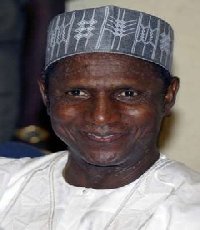Nigeria's president has died after a long illness, an official at his office has said.
Umaru Yar'Adua reportedly died around 2100 local time (2000 GMT) on Wednesday evening at the Aso Rock presidential villa in the Nigerian capital, Abuja.
Ima Nioboro, a presidential spokesman, told reporters in Abuja that the 58-year-old president would be buried in his northern home state of Katsina as seven days of national mourning begins on Thursday.
Yar'Adua had returned to Nigeria in February after three months of medical treatment in Saudi Arabia, but had not been seen in public since.
Al Jazeera's Yvonne Ndege said the severity of his illness had been shrouded in secrecy since he was airlifted out of Nigeria in November 2009.
"He had always suffered some kind of sickness since becoming president, he had had kidney problems and the latest bout of illness was related to a heart condition," she said.
"There were so many local media reports that he was on the mend but we will never really know the true extent of his illness except that he had been terminally ill."
Power transfer
During his absence he failed to formally transfer his powers to his vice-president, Goodluck Jonathan, sparking a constitutional crisis in Nigeria, Africa's most populous nation with 150 million people.
Under Nigeria's constitution, Jonathan now becomes president until the next elections scheduled to be held by April 2011. He also will nominate a vice-president, subject to approval by the senate.
Jonathan assumed the position of acting president on February 9 after a vote by Nigeria's National Assembly while Yar'adua was still in Saudi Arabia.
The assembly left open the possibility for Yar'adua to regain power if he returned to the country in good health, but his long absence from public life and the secrecy surrounding his health sparked months of fierce speculation in the Nigerian media and constant tension between his supporters and those of the acting president.
Jonathan, meanwhile, has consolidated his power, appointing a new cabinet and his own team of advisers.
Difficult times
Abba Aji, a senator and special adviser to Yar'adua on national assembly matters, speaking from the Nigerian capital Abuja, told Al Jazeera he had no objection to Jonathan continuing as acting president and contesting in next year's presidential election.
"I certainly have no problem with this [arrangement] but the ultimate decision as to who will be the next president will have to be made by the Nigerian electorate … as of right every Nigerian has the right to contest the election."
Aji said no one had been able to visit Yar'adua since his return from Saudi Arabia earlier this year because of the arrangements made by his family and his doctors.
Yar'adua's death comes at a difficult time for the country, following a spate of deadly clashes between Christians and Muslims in central Nigeria earlier this year which left hundreds dead.
At the same time there has also been renewed unrest in the oil-rich Niger delta in the country's south.
'Smooth transition'
It is unclear if Jonathan, who is from the mainly Christian south of Nigeria, will run for president in the polls because of an unwritten agreement in the ruling party that power rotates between north and south.
Under the agreement, the north, where Yar'adua hails from, theoretically has another term in office following his death.
Nii Akuetteh, the former executive director of Washington-based think tank Africa Action, told Al Jazeera that Yar'adua pushed through electoral reforms and will be remembered as a clean president.
"When a president dies suddenly, the transition period is always dicey.
"On the other hand, his health has been bad for a long time so the Nigerian power structure has had time to prepare for this.
"I think it will be a fairly smooth transition. I don't expect any kind of upheaval since Jonathan as acting president is already firmly in control."
Akuetteh said the north-south arrangement looks set to be undone by Jonathan who he expected to run for the presidency.
Clean government
Yar'adua took office in 2007 in a country notorious for corruption and was praised by many for being the first leader to publicly declare his personal assets when taking office - setting up a benchmark for comparison later to see if he misappropriated funds.
Andrew Simmons, Al Jazeera's Africa editor, said the death of Yar'adua, Nigeria's first university-educated leader, had been no surprise coming after a long illness, but it was nonetheless a tragic end to what could have been a promising presidency.
Simmons said the Nigerian leader left a legacy of a clean government which included transparency, electoral reforms and an amnesty with militants in the oil-rich Niger Delta.
"He did not achieve many of the reforms he promised mainly because his health had got in the way … but he had achieved something."
Sworn in pledging respect for the rule of law, Yar'adua came to power in what was the first transfer from one civilian president to another since Nigeria won independence in 1960.
PHOTO CAPTION
Nigeria's president-elect Umaru Yar'Adua smiles as he addresses the media in Abuja in this April 23, 2007 file photo. He died late on May 5, 2010 aged 58 after a long battle with kidney and heart ailments.
Al-Jazeera


 Home
Home Discover Islam
Discover Islam Quran Recitations
Quran Recitations Lectures
Lectures
 Fatwa
Fatwa Articles
Articles Fiqh
Fiqh E-Books
E-Books Boys & Girls
Boys & Girls  Ramadan
Ramadan Fatwa Audios
Fatwa Audios Month of Mercy
Month of Mercy Women
Women Eed Al- Fitr
Eed Al- Fitr Food Recipes
Food Recipes Videos
Videos

 Prayer Times
Prayer Times












